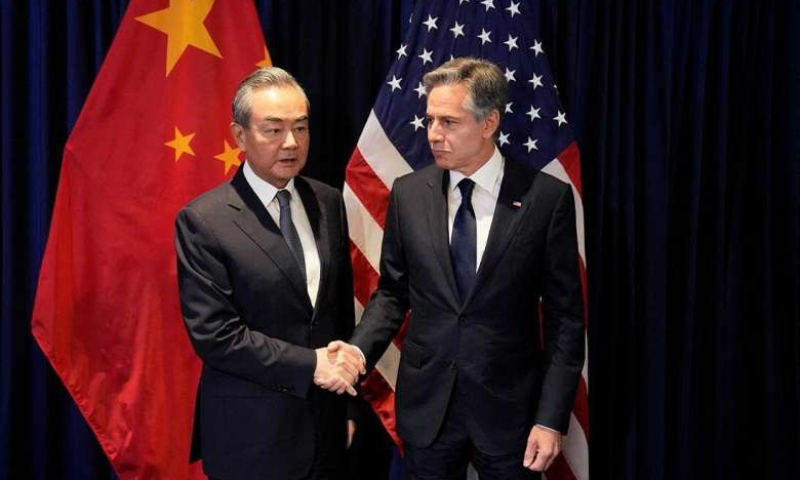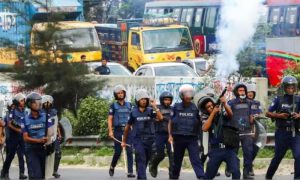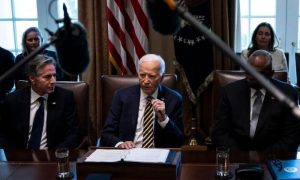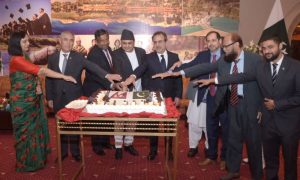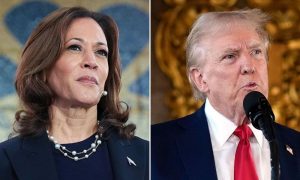VIENTIANE: The United States hailed “open and productive” discussions between Secretary of State Antony Blinken and Chinese Foreign Minister Wang Yi in Laos on Saturday in which Blinken raised US concerns over Beijing’s “provocative actions” around Taiwan.
The meeting took place on the sidelines of the Association of Southeast Asian Nations (ASEAN) foreign ministers’ summit in Laos.
The meeting, which lasted for one hour and twenty minutes, covered a range of critical topics, with a particular focus on Taiwan and human rights concerns. According to US State Department spokesperson Matthew Miller, Blinken raised several key issues during the meeting, including China’s “provocative actions” around Taiwan.
A senior State Department official detailed that Blinken addressed recent Chinese military maneuvers, including a simulated blockade around the time of Taiwan’s President Lai Ching-te’s inauguration. China had conducted extensive naval and air exercises around Taiwan. These drills have heightened tensions across the Taiwan Strait and elicited strong reactions from the international community.
The US official noted that Blinken and Wang Yi had an extended conversation about Taiwan. “They had an extended conversation about Taiwan,” the official said.
China claims Taiwan as part of its territory and has vowed to bring the democratic island under its rule.
In addition to Taiwan, Blinken raised several other contentious issues during the talks. These included human rights concerns in Taiwan, Tibet, and Hong Kong, as well as China’s support for Russia amid its ongoing conflict in Ukraine. The US has been vocal about China’s alignment with Moscow, viewing it as a significant factor in the broader geopolitical landscape.
Blinken also “raised the issue of wrongful detainees held in China and the need to make progress on that,” the official said.
This meeting was part of Blinken’s broader multi-nation visit to Asia, which aims to bolster regional alliances in response to China’s growing influence.
Before the talks, Blinken criticized Beijing’s “escalatory and unlawful actions” in the South China Sea, a critical maritime route for global trade. A recent confrontation on June 17, in which a Filipino sailor was injured by Chinese coast guard members, underscored the potential for conflict. The United States, bound by a mutual defence treaty with the Philippines, has expressed concern over the situation.
On the eve of the meeting, Beijing had made headlines with its warning to the Philippines regarding the deployment of a US medium-range missile system. China’s Foreign Minister Wang Yi cautioned that such deployments could “create tension and confrontation in the region and trigger an arms race.” The US Army had earlier confirmed the deployment of this missile system in the northern Philippines for joint military exercises, although it was later indicated that the system would be withdrawn.
Despite these tensions, there was a recent development in the South China Sea. Manila reported a successful resupply mission to its troops stationed at Second Thomas Shoal, a site of recent clashes with Chinese forces. This development followed a bilateral agreement with Beijing, which Wang Yi urged the Philippines to “honor” without creating “complications.”
In addition to the South China Sea issues, Blinken’s visit to Laos also included a gesture of solidarity with Vietnam. He is scheduled to travel to Hanoi to extend US condolences following the death of Vietnamese Communist leader Nguyen Phu Trong.
The backdrop to these discussions includes a recent meeting between Chinese and Russian foreign ministers, Wang Yi and Sergei Lavrov, respectively, who met on Thursday in Vientiane. The two nations discussed creating a “new security architecture for Eurasia” and agreed to jointly “counter any attempts by extra-regional forces to interfere in Southeast Asian affairs.” The meeting underscored the strengthening political and economic ties between Beijing and Moscow, with NATO members expressing concerns about China’s role in supporting Russia’s activities in Ukraine.
Meanwhile, ASEAN foreign ministers, in their joint communique, emphasized the need for “security, stability, safety, and freedom of navigation in and overflight above the South China Sea.” They also voiced concerns about increasing tensions in the region and the ongoing conflict in Myanmar, which remains a critical issue for the bloc.
Myanmar has been grappling with severe violence since the military coup in 2021, leading to continued fighting between the junta and various ethnic and armed groups. ASEAN’s diplomatic efforts to address the crisis have largely stalled, with the five-point peace plan agreed upon with the junta now effectively inactive.
Myanmar’s representation at the Laos talks was limited to two senior bureaucrats, reflecting the junta’s diminished influence within ASEAN.









